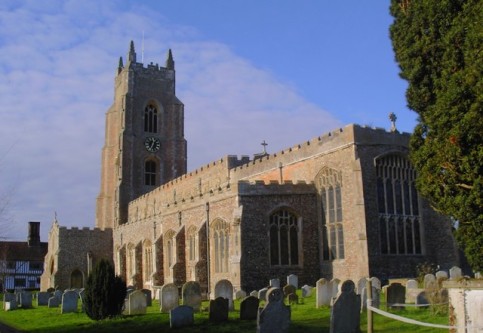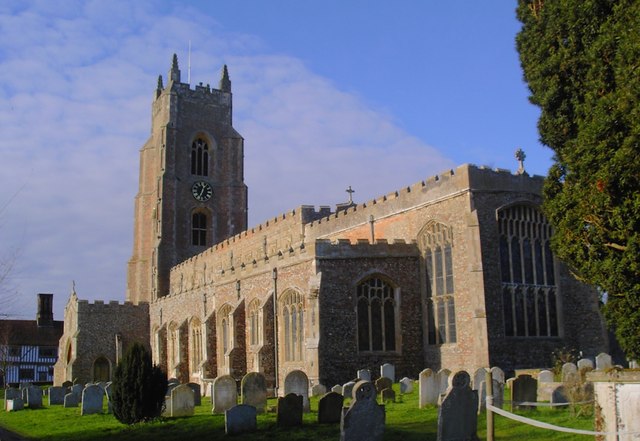
 United Kingdom Roman River Festival 2018 – Debussy, Johanna Müller-Hermann and Wagner: Ilona Domnich (soprano), Festival Ensemble / Orlando Jopling (conductor), St Mary’s Church, Stoke by Nayland, Essex. 29.9.2019. (JPr)
United Kingdom Roman River Festival 2018 – Debussy, Johanna Müller-Hermann and Wagner: Ilona Domnich (soprano), Festival Ensemble / Orlando Jopling (conductor), St Mary’s Church, Stoke by Nayland, Essex. 29.9.2019. (JPr)

Debussy (arr. Iain Farrington) – La mer
Johanna Müller-Hermann – Drei Gesänge
Wagner (arr. Iain Farrington) – Götterdämmerung – An Orchestral Fantasy
The Roman River Festival describes itself as ‘A festival for everyone’. It has come a long way since it began in 2000 and their website triumphs how it ‘brings a mind-boggling variety of performers to informal and unexpected venues in Colchester, Stoke by Nayland and coastal Essex each September for a 10-day festival … From internationally renowned classical musicians to beatboxers, choreographers and digital artists, there’s something for everyone … Our festival is informal, open to everybody, with no rules. We convert disused urban buildings into performance venues because there is no concert hall in Colchester … We create opportunities for over 1,000 young people to compose, perform or listen to music and get involved in the performing and visual arts … With our partners Dance East, the Mercury Theatre, and Colchester Arts Centre, we commission new work and collaborations, nurture emerging talent We give artists the time and space to develop their skill and create new work among the salt marshes and wide open skies of coastal Essex … Active involvement in music by schoolchildren has been shown to improve concentration, self-confidence, social awareness and ability in maths and English. Giving young people the chance to listen to live music and develop their own music-making has remained at the core of our organisation, and our dream is to give every schoolchild within reach of the festival the life-enhancing opportunity to compose, perform or listen to music.’
Whenever I have passed signs for the village of Stoke by Nayland on the A12 it always seemed like a place name that would be more appropriate for a Sherlock Holmes short story. Having traversed some narrow and rutted country lanes though barren fields to the middle of nowhere Suffolk, I arrived at the splendid St. Mary’s Church. I found the following information about the church and how it is ‘Dedicated to St Mary the Virgin, it is one of the largest and finest churches in Suffolk, with a history stretching back to the 10th century, but refashioned in the Perpendicular style by the Howards, Dukes of Norfolk, in the late 1400s. Its tower dominates the landscape of Dedham Vale, and can be seen for miles around. Its outstanding treasure is the 15th century carved oak doors in the south porch, unique in Suffolk, but the font is very fine, and no less a person than the artist John Constable has said that “the lofty and slender proportions of the tower arch are the crowning beauty of the whole interior”.’
The conductor for this concert, Orlando Jopling, has been Artistic Director of the festival since 2007 and in his introduction in the programme mentioned the ‘perfect acoustics’ of St Mary’s. This was not hyperbole I can assure you, as several times I closed my eyes to listen to the Festival Ensemble (who numbered barely more than 20) sound like an orchestra nearly three times the size.
I understand Iain Farrington is a pianist, organist and composer and he had arranged the Debussy and Wagner we were hearing. About La mer Farrington wrote: ‘The often transparent approach to the orchestration, lightness of touch and soloistic nature of the score lends itself well to a reduced ensemble. By including many of the original instruments in a suitable sized orchestra, the work can be effectively conveyed with little loss of colour and variety, with hidden detail made more apparent.’ What worked for Debussy – I can assure you – also worked splendidly for Wagner’s Götterdämmerung.
Most will know how Debussy completed his La mer (described as ‘three symphonic sketches for orchestra’) in early 1905 at the Grand Hotel, Eastbourne, which he described as ‘a charming peaceful spot: the sea unfurls itself with an utterly British correctness.’ Indeed, the strings, woodwind, timpani and harp were all that were needed to experience the mist clearing to reveal a sun dappled sea at dawn, before the winds begin to blow and change the calm waters into the heaving waves of a rough sea for the brassy climax to La mer.
We then heard Drei Gesänge (Three Songs) by Johanna Müller-Hermann (1878-1941) as part of the festival’s ongoing ‘celebration of the works of women composers’ whose contribution to music has been largely forgotten. The BBC website tells us how Müller-Hermann ‘was an Austrian composer and pedagogue. Originally a primary school teacher, she gave up this career after marriage and retrained in musical composition. She became especially known for her orchestral music, chamber music and songs, and her use of subtle chromatic harmonies.’ That she studied with Alexander Zemlinsky is clear from what we heard and one of his other pupils was Alma Mahler who Müller-Hermann dedicated one of her other songs to. Alma Mahler’s own surviving songs is what most came most to mind as we heard ‘Vorfrühling’ (‘Early spring’), ‘Trauminsel’ (‘Dream island’) and ‘Liebeshymnus’ (‘Hymn to love’). Ilona Domnich’s proto-dramatic soprano voice gave impassioned renditions of these songs with texts by Hugo von Hoffmanstahl and Tona Hermann full of the usual Romantic preoccupations. When Müller-Hermann’s melodic lines soared, Richard Strauss was another composer who seems to have been an influence on her.
After the interval we heard Iain Farrington’s Orchestral Fantasy with the highlights from Wagner’s Götterdämmerung as ‘one continuous work, essentially a tone poem without voices’. For as long as I can remember I have written about the so-called ‘bleeding chunks’ we often hear from this opera. It usually begins with a quick glimpse of ‘Dawn’ and snatches of the duet between Siegfried and Brünnhilde before he sets off – seemingly on a speedboat – down the Rhine! Farrington’s stunning arrangement smooths everything out and throws in the mix Hagen summoning the Gibichung vassals, the Rhinemaidens cajoling Siegfried to return the ring, before we get the more ‘traditional’ death of Siegfried and his ‘Funeral Music’ (not really ‘March’). With Jopling’s coaxing hands getting the very best out his virtuosic musicians it all built to an incredible climax as together they melded the myriad motifs into a musical eulogy for the slain hero which culminated in excerpts from Brünnhilde’s ‘Immolation Scene’ and the coda’s soaring redemption theme. It lasted barely 40 minutes yet never have Wagner’s words been so redundant.
It would have been good had more people been there to hear this splendid concert. What were they doing? Surely they were not at home watching Strictly Come Dancing? I heard mutterings of Wagner being ‘heavy stuff’ and how the words ‘Wagner and Götterdämmerung’ must have put people off! If audiences at the Roman River Festival can enjoy Mahler there, then they should come out in droves to hear the music of Wagner who was his idol. I suspect this might be the last Wagner we might hear at the festival for a while though there should be no problem including the Wesendonck Lieder, at the very least, in coming years.
Jim Pritchard
For more about the Roman River Festival click here.
